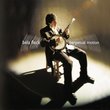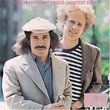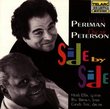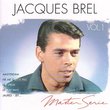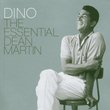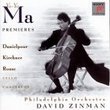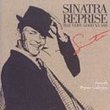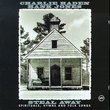| All Artists: Kayhan Kalhor, Ali Akbar Moradi Title: In the Mirror of the Sky Members Wishing: 4 Total Copies: 0 Label: World Village USA Release Date: 6/8/2004 Album Type: Import Genres: Folk, International Music, Pop Styles: Traditional Folk, Middle East Number of Discs: 1 SwapaCD Credits: 1 UPC: 713746803025 |
Search - Kayhan Kalhor, Ali Akbar Moradi :: In the Mirror of the Sky
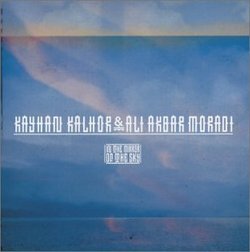 | Kayhan Kalhor, Ali Akbar Moradi In the Mirror of the Sky Genres: Folk, International Music, Pop
The origins of ancient Persia's (i.e., modern-day Iran's) secular classical canon and parallel Islam-based Kurdish tradition both reach back hundreds of years. Each depends on the memorization of complex scales and discipl... more » |
Larger Image |
CD DetailsSynopsis
Amazon.com The origins of ancient Persia's (i.e., modern-day Iran's) secular classical canon and parallel Islam-based Kurdish tradition both reach back hundreds of years. Each depends on the memorization of complex scales and disciplines, which paradoxically provide an ideal firmament for intricate, feverishly sensual flights of modal-flavored improvisation. Kayhan Kalhor plays the kamencheh, a spike fiddle ancestor of the medieval rebec and modern violin. A member of the Persian/Indian ensemble Ghazal, he was nominated for two Grammys in 2003. His collaborator, Ali Akbar Moradi, is a singer, teacher, composer and renowned exponent of the Kurdish tanbur, a long-necked pear-shaped lute with 14 gut frets. Accompanied by the tombak (goblet drum) virtuoso, Pejman Hadadi, the two explore a repertoire associated with the Yarsan people of Kurdistan. Western early music fans will notice certain haunting similarities to surviving Crusades-era works, but even total neophytes will be transported by the performers' passion and finesse. --Christina Roden Similarly Requested CDs
|
CD ReviewsA Direct Hit John Grunwell | Washington, D.C. | 07/09/2004 (5 out of 5 stars) "Fans of Persian and Kurdish music will absolutely love this recording, which unites two amazing musicians. Not quite as lush as the everything-but-the-kitchen-sink arrangements of the Kurdish ensemble The Kamkars, they more than make up for that with more richly ornamented melody and depth of feeling. There's little thunderous daff drumming to be heard here, which is, for me at least, one of the more appealing aspects of Kurdish music. An excellent, EXCELLENT CD." Fantastic !! Rizgar | Sweden | 11/22/2005 (5 out of 5 stars) " This is absolutely one of the best Kurdish albums yet released, and one of the best interpretations of the deep-rooted music of the Kurdish Yarsanî cult. Muradî is indeed the greatest master (mamoste) of this music, and it's cool to see Kalhor returning to his roots here. Both perform with great depth and mastery in a unique combination. The three last pieces are particularly impressive. A great album for anyone interested in listening to one of the most ancient and authentic musical traditions in the world!" Among the best Persian classical albums George Banjo | Seattle, WA USA | 08/19/2008 (5 out of 5 stars) "Kayhan Kalhor (a member of Ghazal, Yo Yo Ma's Silk Road project, Masters of Persian Music and many other solo and collaberative projects) is one of the finest Persian musicians, and really one of the best in the world. He plays the kemenche (spike fiddle), the ancestor to the violin, and his kemenche has a lighter, less rich, more piercing tone that sounds like rustling leaves. It accompanies and imitates the voice to great effect, but is also capable of breaking into high, lightning-fast and soulful improvisations.
Ali Akbar Moradi is probably less well known in the west but is equally good. Moradi's tanbur playing here (on a kind of metallic-stringed lute) is mesmerizing and capable of playing clear, snapshot melodies as well as evocative drones on his many strings, or both at once. The interesting liner notes reveal that playing the tanbur is incredibally difficult, and Ali Akbar Moradi does it like the master he is. His voice is powerful and echoes the unusual Kurdish modes and scales. So, the two of them playing together is something amazing. It's a fusion, in a way, of Persian classical with Kurdish music (they both come from an Iranian Kurdish background, and Kayhan Kalhor, at least, is also a Persian classical musician (Ali Akbar Moradi may be as well). But more that, it's a fusion of two instruments, two styles, two masterful musicians, into glorious music. The whole CD is, I think, one studio-recorded performance, as the tracks move into eachother without pause. The recording quality is crisp and flawless and especially accentuates the sound of the tanbur's strings, making them seem less harsh than on some recordings. The first track is an introduction, introducing you to the instruments and the notes, which quickly shifts into a fiery duet with no percussion but with the drone of Moradi's tanbur's strings and the stocatto thrusts of Kalhor's kemenche providing rhythm. (On a few tracks there's some tombak drum providing rhythm) By the third track Moradi's voice has entered the mix. Things quiet down as he sings the most soulful melodies. It would do well on a film soundtrack, but it just forces you to reflect on things, to think, and to feel the deep sense of longing or something. Anyway, though it's not too helpful to say so, this is simply one of the best albums you can get. Fans of Persian or Iranian music should not miss this, and fans or Indian classical music or even jazz would definitely be able to understand this." |

 Track Listings (10) - Disc #1
Track Listings (10) - Disc #1